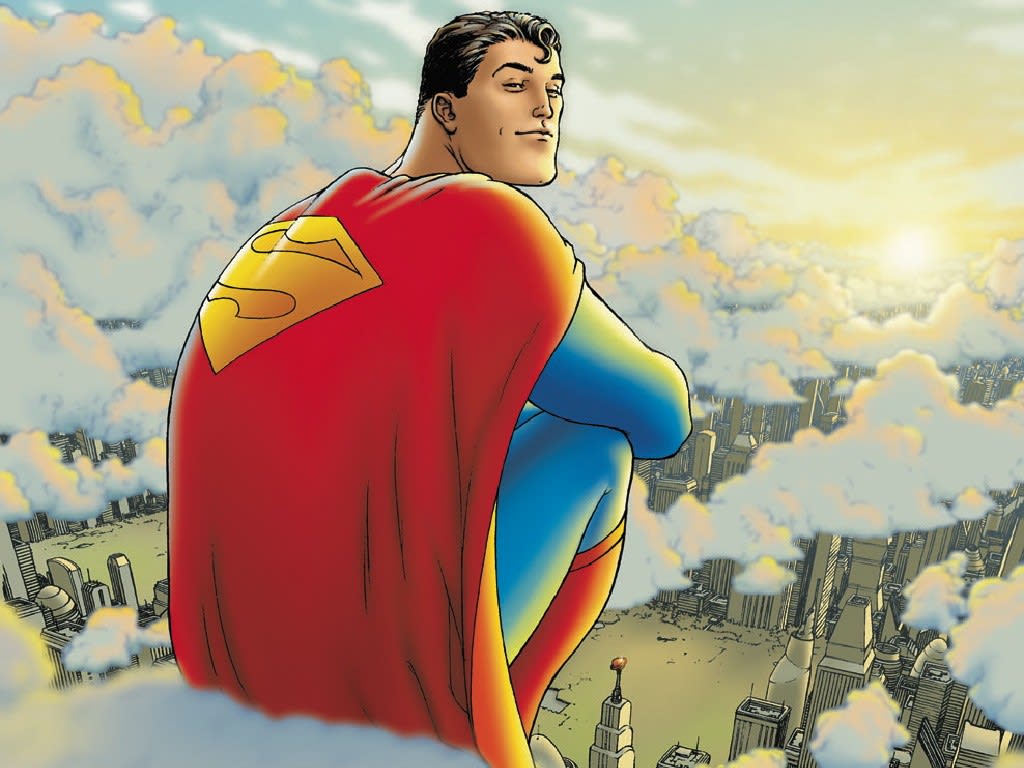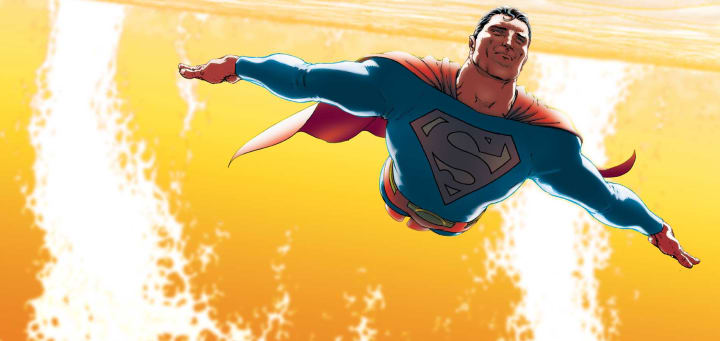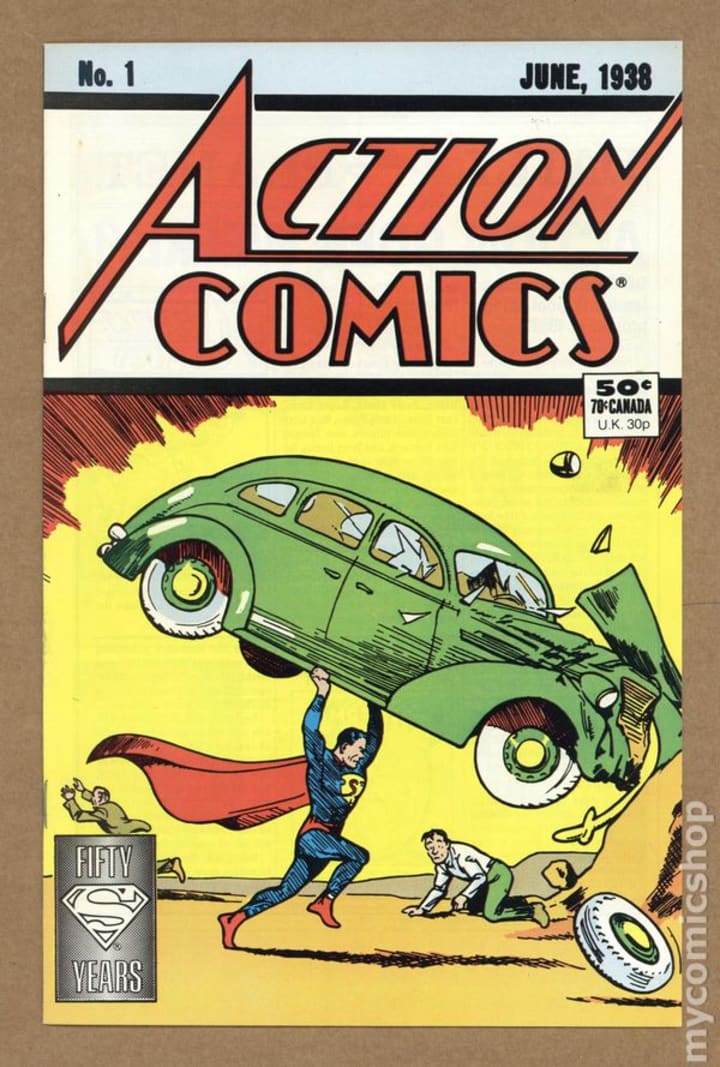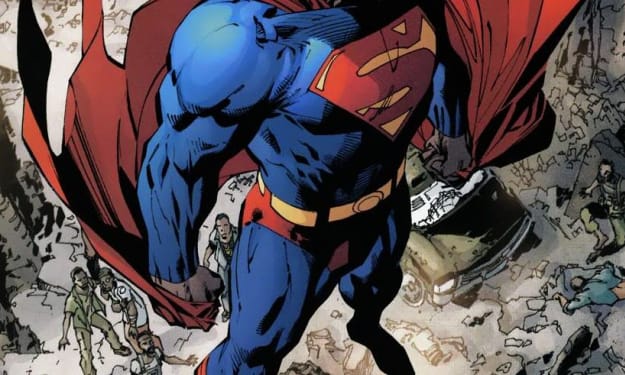The Superhero, Part of a Global National Strategy
The Ubermensch

Superman appeared in the pages of "Action Comics #1" in 1938 spearheading a literary genre that would grab the hearts of millions for generations to come. The superhero genre was in a sense, an affirmation at first of America's immigrant spirit as Jerry Siegel and Joe Shuster exemplified in their Jewish immigrant fight for notoriety and novelty attempting for five years to get their character published in a major newspaper as a comic strip. The authors of the famed character read pulp science-fiction and adventure magazines which were a major influence on their creation of the character. Superman, originally conceived by the authors as a villain, created him as a hero with an alien origin in order to answer the thirst for the sensational and "sell papers." This is where the superhero genre differs from the mythology of yesteryear: the comic book functions as modern mythology whose primary purpose it is to entertain and not to teach. Science-fiction has thus the formative element in advanced cultures to entertain the audience and provide a mythology that serves the purpose of wish fulfillment and fantasy, and not the primary moral and religious nature of the Old Gods.
The superhero genre arrived on the scene following upon the First World War, which was costly for The Allies. Dubbed "the first modern war" with its mass scale use of "machine guns, tanks, aerial combat and radio communications" it cost 10 million lives, sparked the Spanish flu in Europe and featured the use of chemical weapons on a mass scale. It left Europe in economic collapse and indebted to the United States. The Great Depression in the United States from 1929 to 1939 was a severe economic depression of the United States that paralyzed the nation for years with poverty, famine, and misery. The superhero genre arose within this climate when humanity, disillusioned with the belief in God and the supernatural, had abandoned itself to the hopes and the aspirations of science. Superman represents that hope. Science-fiction functioned as a cultural power that filled the absence of God and the saying "God is dead" by Nietzsche proved true after the catastrophe of the Great War and the misery of the Great Depression.
It appeared that people were looking for salvation not from the heavens, but from science and from Earth. The Superman represents this attempt at salvation, at saving the human race from the catastrophe of civilization: war, poverty, misery, crime. Science-fiction firmly anchors the Superman as something more than a mere Ubermensch, but as an actual alien visitor, an immigrant from another planet who thanks to the yellow sun and the Earth gravity gains superhuman powers and fights to defend the defenseless, the poor, and the marginalized. From the beginning, Superman appears a bit as a socialist, if not an anti-hero since he targets the rich and the well-off oppressing the poor and the marginalized. He is the defender of the most vulnerable elements of society against the 1 percenters, “a greedy, corrupt social elite.” At the beginning of his adventures, in the 1940s, Superman fought corruption and not simply crime-fighting.
The Global National Strategy

All Star Superman #1
The superhero genre appeared during a time when Nazi Germany was rising in Europe and America was in the middle of the Great Depression. It was very much a national response to the avowed Nazi threat of the Ubermensch and of its desire to develop a super powered population of Aryans with pure genetic pool. A pure race of Overmen! It is within this context that the superhero answers a global national strategy: to use the resources of entertainment under the form of science-fiction in order to protect America's interests against the threat of a more advanced civilization whose stated goal is to produce a race of Ubermensch.
In his adventures, Superman engaged in nuclear tests. A comic book shows Superman filming an atom bomb test for the Army, which ends up censored by the United States War Department during the Second World War as a reference to dropping the bombs on Hiroshima and Nagasaki.
The global national strategy as evidenced in the superhero genre in the 1940s then, is to use science-fiction to defend America's interests using advanced alien technology against the threats of rogue nations and the Ubermensch program, in this instance, Nazi Germany. The advanced stage of alien development was seen in the use of super powers, "beyond those of mortal ken," which over the years became so sensational that they exponentially increased in application.
“His million-decibel yell had enough intensity and pitch to topple tall buildings,” wrote Larry Tye, in Superman: The High-Flying History of America’s Most Enduring Superhero. “What if a building fell on him? A tickle at most. His nostrils were super-acute. His typing was super-fast. … His gaze was intense enough to hypnotize a whole tribe of South American Indians at once. He could converse with a mermaid in her native tongue and beat a checkers expert his first time playing."- Timeline, "How Superman went from righteous to dangerous"
In his early adventures, Superman faced Lex Luthor. In one of his adventures, Lex Luthor launches an atomic bomb. This reveals that in addition to corruption by 1 percenters, the other enemy of America was mad science. In this regard, Lex Luthor can be interpreted as symbolizing the mad science of the Nazi regime in their attempt at creating a genetically pure breed of super powered humans using only mad science even at the price of atomic war. The superhero, the product of advanced science himself, presents as a response to the threat of mad science, of experimentations that are beyond the international geo-political statutes and against America's interest. The story, too, was censored at the time.
Science can be used as a tool for human progress but also as a tool of destruction in the wrong hands. The Manhattan Project during World War II which gathered some of the brightest minds on Earth, was gathered in order to help America create an atom bomb which would respond to the threat of Nazi Germany and also for the development of nuclear weapons that would serve as a deterrence against America's interests. In this context, the superhero genre serves a global national strategy of protecting the development of nuclear weapons by the United States of America.
Action Comics #1

Action Comics #1
About the Creator
Patrick Ouandji
Biochemistry major from Texas State. Pre-med student. Fluent in English, Spanish (conversational), and French. Member of Justice League of America.
The place of the super feat!






Comments
There are no comments for this story
Be the first to respond and start the conversation.